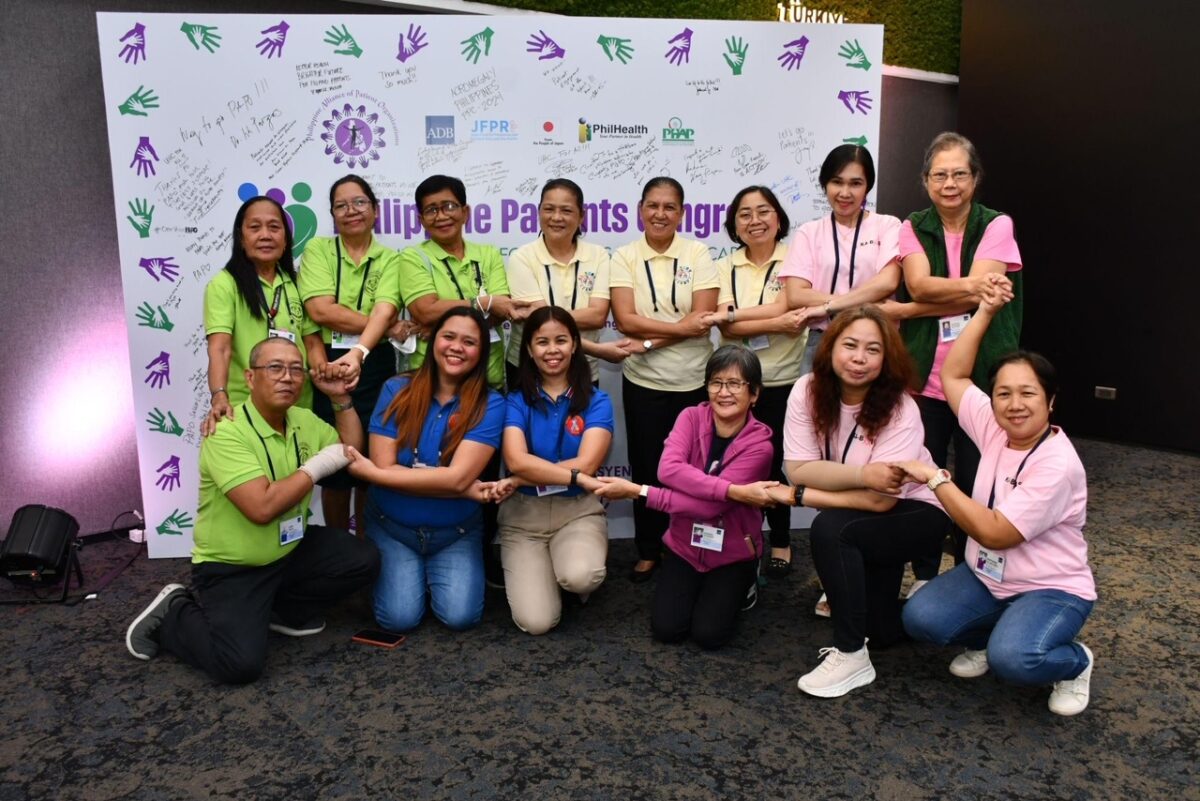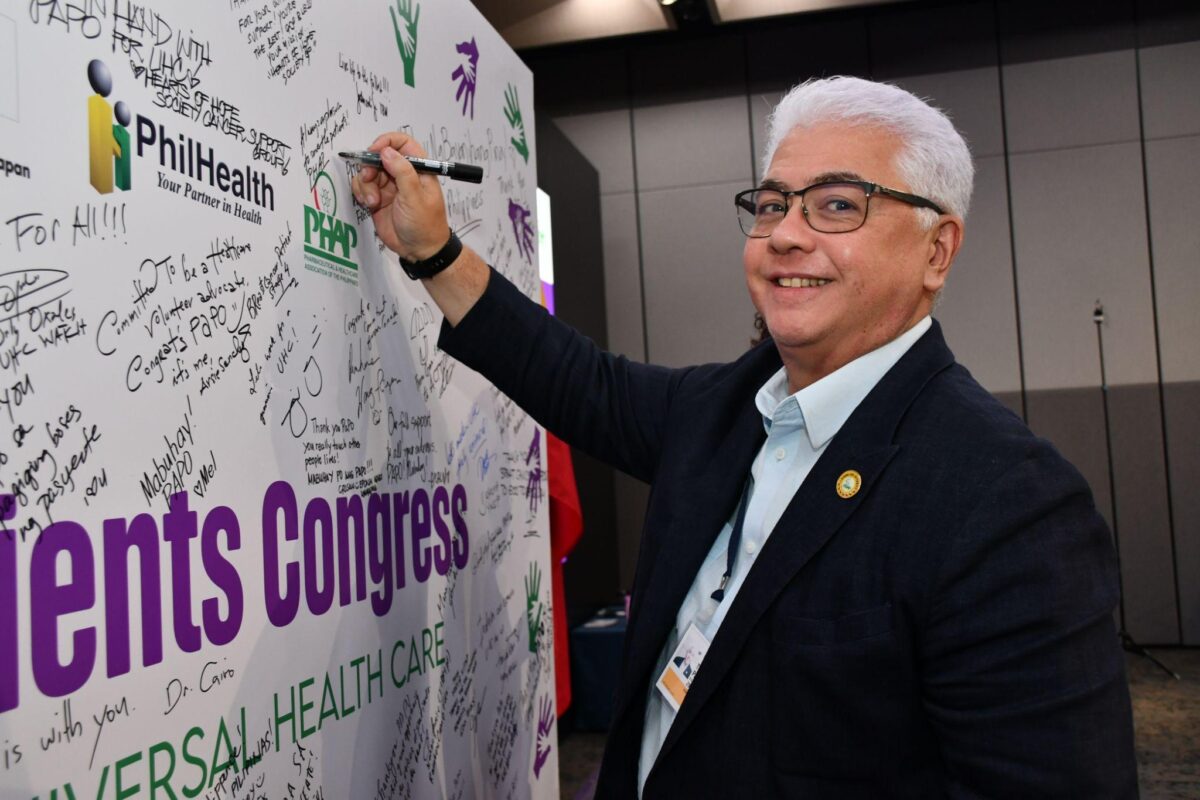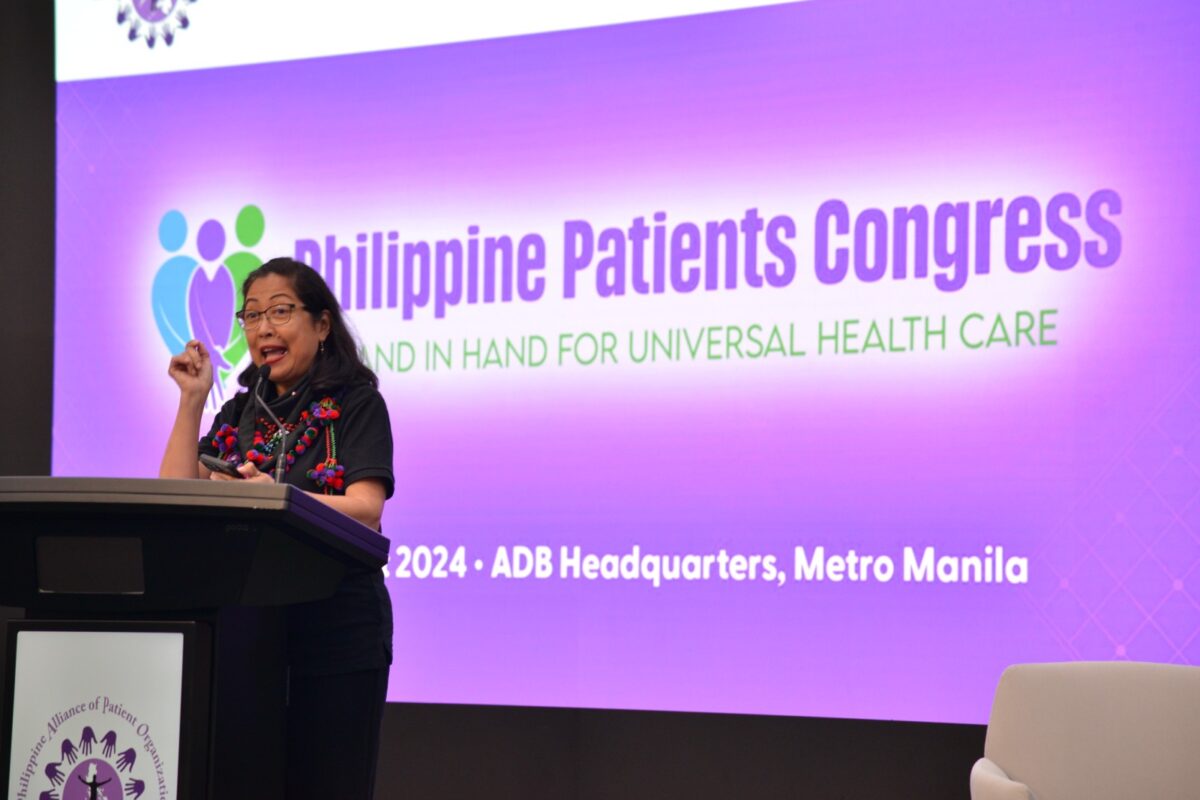Historic Philippine Patients Congress bares strategies for strengthening the patient’s voice in health policy-making
The Philippine Alliance of Patient Organizations (PAPO), together with the Pharmaceutical and Healthcare Association of the Philippines (PHAP), the Asian Development Bank (ADB) and Philippine Health Insurance Corporation (PhilHealth), mounted the first-ever Philippine Patients Congress on August 29 to 30, 2024.
With the theme “Hand in Hand for Universal Health Care”, this historic event brought together 300 patient advocates, caregivers, healthcare professionals, and representatives from the government, academe, and the private sector to elevate the dialogue on patient advocacy, as well as strengthen the united call to action to deliver on the promise of Universal Health Care (UHC).
“Our organization is an institution built by different working hands,” says Karen Alparce-Villanueva, President of PAPO. “With our hands, we have the power to help, heal, serve, and support. The power of hands is the inspiration behind the key message of our Patients Congress, as we all come together, hand in hand, to elevate Universal Health Care in the Philippines.
Advancing Universal Health Care for all
Also known as “Kalusugan Pangkalahatan” or “Health for All”, Universal Health Care (UHC) is a government mandate that aims to ensure every Filipino receives affordable and quality health benefits by providing adequate human resources, health facilities, and health financing. Despite this mandate, many patients still pay out-of-pocket for their hospital bills.

Senator JV Ejercito, the principal author of the Universal Health Care (UHC) Act, served as the keynote speaker during the first Philippine Patients Congress held on August 29 to 30, 2024. He is pictured here with Karen Alparce-Villanueva, President of the Philippine Alliance of Patient Organizations (PAPO), together with PAPO founders Kara Magsanoc-Alikpala and Girlie Garcia-Lorenzo, PAPO board members, and David Celdran, event host.
“Rest assured, I will continue to advocate for laws and reforms that prioritize patient-centered care, ensuring healthcare delivery in the Philippines is responsive, equitable, and inclusive.” This was the promise of Senator JV Ejercito during his keynote speech on the first day of the Patients Congress. As the principal author of the UHC Act, Ejercito has been pushing for amendments to the UHC Act, especially in the aftermath of the COVID-19 pandemic.

All smiles as patients and advocates from patient organizations across the country participate in the first-ever Philippine Patients Congress. They signed the commitment wall as a pledge to continue strengthening the patient’s voice in forwarding health policies and ensuring support throughout the patient’s continuum of care.
Aside from its role in funding and legislation, governments also play a crucial role in building capacity so civil society can have meaningful representation and contributions to health policies, explains Ogusa Shibata, Technical Officer for Health Care Quality and Patient Safety, Maternal Child Health, and Quality Safety at the World Health Organization (WHO).
“Leaders from respective countries must set the example and pave the way to make participatory decision-making the modus operandi of the health system,” adds Shibata. “Champions are important across the health system, so we can embed social participation in the design and implementation of health policies and programs.”

Mr. Teodoro Padilla, Executive Director of the Pharmaceutical and Healthcare Association of the Philippines (PHAP), signs the commitment wall during the first-ever Philippine Patients Congress. PHAP’s mission is to serve patients and advocate for policies and practices that improve access to innovative and life-saving therapies.
Social participation covers the entire continuum of care — from involving patients in drafting health policies, developing clinical practice guidelines, and managing safety for clinical trials, to upholding pharmacovigilance and post-marketing surveillance. Shibata also highlighted the recent WHO resolution on social participation for universal healthcare, emphasizing the need for sustained political will and investment in participatory processes.
Raising the patient’s voice by mobilizing patient advocacy groups

Ms. Fatima “Girlie” Garcia-Lorenzo, the Philippines’ first Ashoka Fellow and one of the founders of the Philippine Alliance of Patient Organizations (PAPO), delivers her welcome remarks at the first-ever Philippine Patients Congress. She also shares the “Pulso ng Pasyente” survey results, which revealed patient advocates want more knowledge and more time with patients to understand their needs better.
One of the best ways to embed champions across the health system is through patient organizations. From HIV/AIDS and breast cancer,to cervical cancer and psoriasis, the patient advocacy movement has been instrumental in raising the patient’s voice and forwarding meaningful change in healthcare delivery. “We have our rights, but we also have responsibilities. Let us all do something to uplift our health system,” reminds Ms. Fatima “Girlie” Garcia-Lorenzo, one of the founders of PAPO.
Mr. Josef De Guzman, the founder and CEO of Psoriasis Philippines, emphasized the need for patient engagement in improving policy-making and raising public awareness for less-familiar diseases, such as psoriasis. Aside from firming up their mission and purpose, De Guzman also urged patient organizations to formalize their groups by registering and maintaining accurate records. In doing so, they put themselves in a better position to diversify their fund sources.
Meaningful engagement means bringing the experiences of all stakeholders into the policy development process, shares Mr. Ralph Emerson Degollacion, OIC Managing Director of Health Justice Philippines. Using a case study on raising sin taxes to fund UHC, Degollacion also highlighted the importance of data in forwarding patient advocacy.
“Policy change proposals must be data-driven and evidence-based,” he adds. “If there’s hard data, policymakers can’t just dismiss [your call to action].” Data is also key to countering misinformation and fake news in the digital age, especially regarding vaccination and clinical trials.
While quantitative data, such as cost comparisons and spending data, are crucial in policy debates, patient organizations can lend a hand in collecting meaningful qualitative data — patient experiences. They can develop, assess, and adjust their key messages to reach and convince their target audience. “Choose your messengers within your core group — you can all be good storytellers,” adds Degollacion.
Local leaders also have the power to bring their patient advocacy to the global stage, working with local and international partners to translate policies into actionable measures, reminds Dr. DurhaneWong-Rieger, President and CEO of the Canadian Organization for Rare Disorders (CORD). Local patient organizations must overcome internal conflicts, learn from each other’s experiences, coordinate their efforts, and work both inside and outside the healthcare system to achieve their common goals — improving patient safety and care.
“You have to talk to one another. Communication is probably the most important part of what [patient organizations] must do to stay together. Share problems and ways of working together. Can you work through finding solutions together?” adds Wong-Rieger.
As the first-ever Patients Congress came to a close, Mr. Christopher Muñoz, Vice President of PAPO, encouraged patient organizations to upskill to understand health systems better, identify gaps, and provide evidence-based solutions to policymakers. “You have to be strategic and learn how to play the system. Learn where your strengths and weaknesses are to move things forward,” he adds.
ADVT.
This article is brought to you by the Philippine Patient Congress.